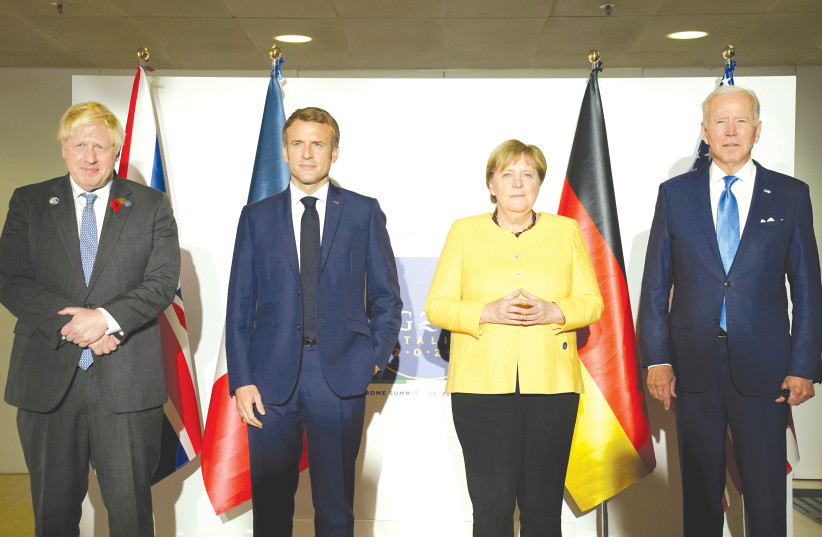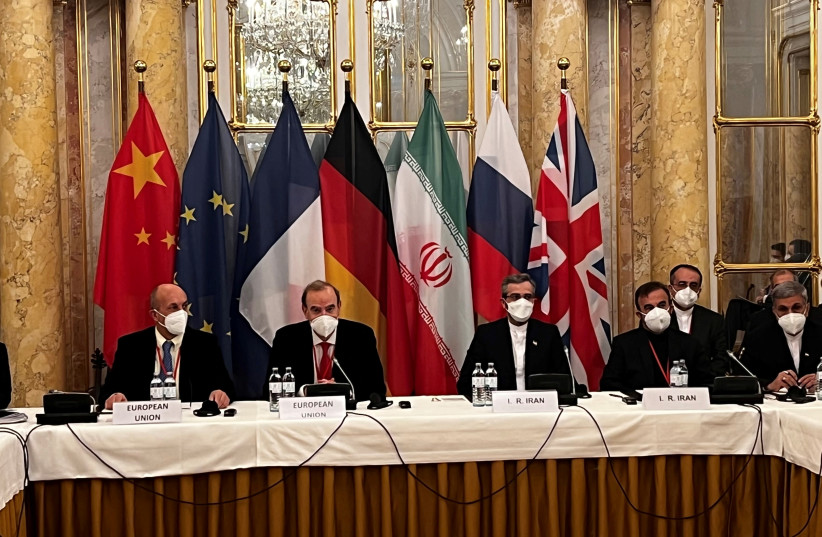DANNY CITRINOWICZ, JASON M. BRODSKY

The nuclear negotiations with Iran continue in Vienna. Regardless of the outcome, world powers need to view the Iranian challenge as not just a nuclear file.
In the October statement from the E3 (France, Germany and the United Kingdom) and the United States, they pledged their “shared determination to address broader security concerns raised by Iran’s actions in the region.”
But the European Union still maintains a fictional distinction between the political and military wings of Iran’s proxy Hezbollah. The two units are two sides of the same terrorist coin, and the international community needs to treat them as such if it hopes to sustain deals with the Islamic Republic.
All of Hezbollah’s organs answer to the same leadership – meaning Hassan Nasrallah and the Shura Council, Hezbollah’s highest decision-making body. Accordingly, there are five subcommittees within the Shura Council – which include the executive, parliamentary, political, jihad, and judicial councils. The Jihad Council of Hezbollah provides oversight over military operations.
The interplay among councils can be seen in the active participation of Hashem Safieddine, head of the Executive Council, at Hezbollah’s military parade in al-Qusayr in November 2016. That is not to mention the experience that other Shura Council leadership has in parallel organs. The head of the Judicial Council, Muhammad Yazbek, has also managed a military command in central Lebanon and has overseen training camps and weapons smuggling, according to the US government.
 Deputy Secretary General of the European External Action Service (EEAS) Enrique Mora and Iran's chief nuclear negotiator Ali Bagheri Kani wait for the start of a meeting of the JCPOA Joint Commission in Vienna, Austria, December 3, 2021. (credit: EU DELEGATION IN VIENNA/HANDOUT VIA REUTERS)
Deputy Secretary General of the European External Action Service (EEAS) Enrique Mora and Iran's chief nuclear negotiator Ali Bagheri Kani wait for the start of a meeting of the JCPOA Joint Commission in Vienna, Austria, December 3, 2021. (credit: EU DELEGATION IN VIENNA/HANDOUT VIA REUTERS)Deputy Secretary-General of Hezbollah Naim Qasim himself has stated that Hezbollah “has one single leadership, and its name is the decision-making Shura Council. It manages the political activity, jihad activity, cultural activity and the social activities.”
Hezbollah’s three wings – military, political and social – maintain a synergy that enables the organization to present the outward appearance of a legitimate and pragmatic Lebanese party working to defend Lebanon. However, in practice, the military power strengthens the political power in the domestic Lebanese arena, while the organization’s political and social activity is utilized to provide diplomatic cover for its military-terrorist infrastructure.
In keeping with this structure, Hezbollah’s leaders deny any distinction. For example, Muhammad Fanish, a senior operative, stated in 1992, “Armed resistance requires assistance in the political arena.... Our entry into parliament is a factor that helps the armed resistance against the occupation.”
The US government has noted that Ibrahim Ali Daher, who serves as chief of Hezbollah’s Central Finance Unit, “oversees Hezbollah’s overall budget and spending, including the group’s funding of its terrorist operations and killing of the group’s opponents.”
This is telling, as the money flows from the same source to all branches.
Members of Hezbollah have also used their platforms as legislators in the Lebanese parliament to advance the Party of God’s agenda. For example, Muhammad Hasan Ra’d, according to the US Treasury Department, doubles as a member of parliament and Hezbollah’s Shura Council, “which directs Hezbollah units to carry out overseas military and terrorist attacks.”
The relations between Hezbollah’s External Security Organization (ESO) – which is a subsidiary of the military wing – and the Foreign Relations Department – a subunit of the political wing – are also instructive.
In 2004, the US Treasury Department claimed that Assad Ahmad Barakat – one of Hezbollah’s most prominent operatives in South America – was collecting “sensitive information” about local Arabs traveling to the United States and Israel. He then transmitted that information to the FRD in Lebanon.
In another case, Washington revealed how FRD operatives Fouzi Fawaz and Abdallah Tahini eventually became “members of a Hezbollah terrorist cell” in Nigeria along with Fawaz’s brother, Mustapha, an ESO operative. Fouzi was accused of possessing “heavy weapons” and being involved in “other terrorism-related activities.” After a Hezbollah weapons cache was found in the city of Kano in 2013, Nigerian authorities issued arrest warrants for Fouzi and Tahini.
Governments that promote a distinction between the military and political wings of Hezbollah are ignoring the reality on the ground. The EU and France may want to keep diplomatic channels open in Lebanon, but adhering to the distinction sends a clear message of weakness and willful blindness.
In fact, Europe is jeopardizing its own security by adopting this policy.
For instance, in 2014, Germany shuttered the Lebanon Orphan Children Project, which has links to Hezbollah and the Iran-linked Martyrs Foundation. An investigation found that the project – with an innocent-sounding name – raised $4.54 million from 2007-13 for the Martyrs Foundation, which is sanctioned and has provided financial support to the families of suicide bombers. The foundation officials, according to the US government, “were directly involved in Hezbollah operations against Israel during the July-August 2006 conflict.”
In 2018, French police raided the Zahra Center, which has ties to Hezbollah. During the raids, police found weapons.
Thus, Europe has provided a permissive environment for Hezbollah to survive and thrive for years.
But there is a growing trend to outlaw the organization in its entirety; the United Kingdom, Germany and others have made important strides in this regard. Australia has as well. It is time that the EU and France follow suit.
When the nuclear deal was originally inked in 2015, reports later emerged that the White House during the Obama administration clipped the wings of the US Drug Enforcement Administration and the Central Intelligence Agency to prevent them from taking more aggressive steps to pressure Hezbollah, because of the ongoing nuclear negotiations. This mistake should not be repeated.
The international community must learn how to contain Iran and its terrorist proxies on nuclear and nonnuclear matters at the same time.
Iran and its Axis of Resistance have demonstrated dexterity in undertaking diplomacy and pressure simultaneously.
If the E3 and the United States want to ensure that any nuclear deal with Iran lasts, they must crack down equally as hard on proxies such as Hezbollah and not allow Iran to use any agreement as a shield to prevent accountability for other malign activity.
Blacklisting Hezbollah in its entirety as a terrorist organization is one step that the EU and France can take to show they are serious about addressing regional security concerns.
No comments:
Post a Comment